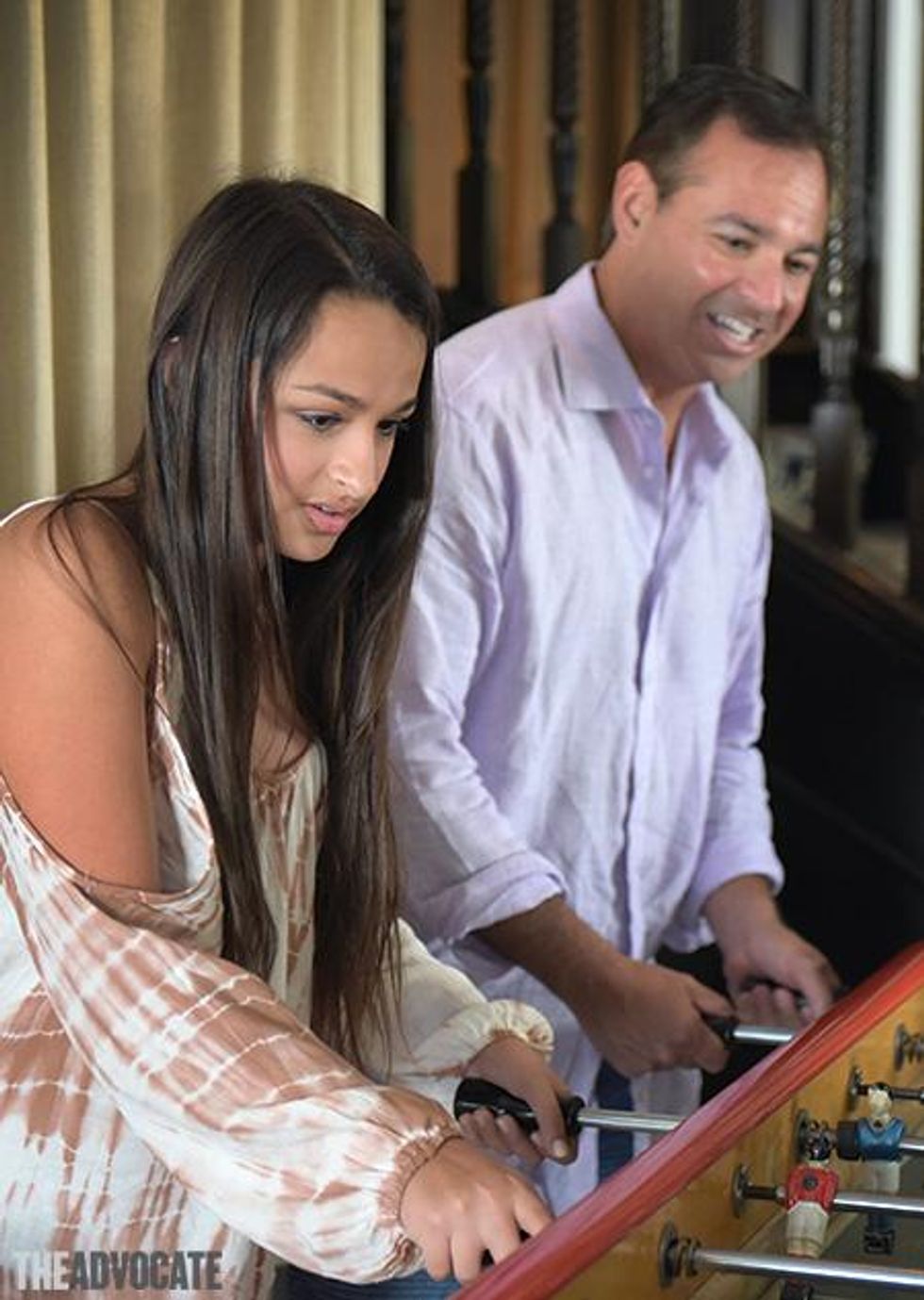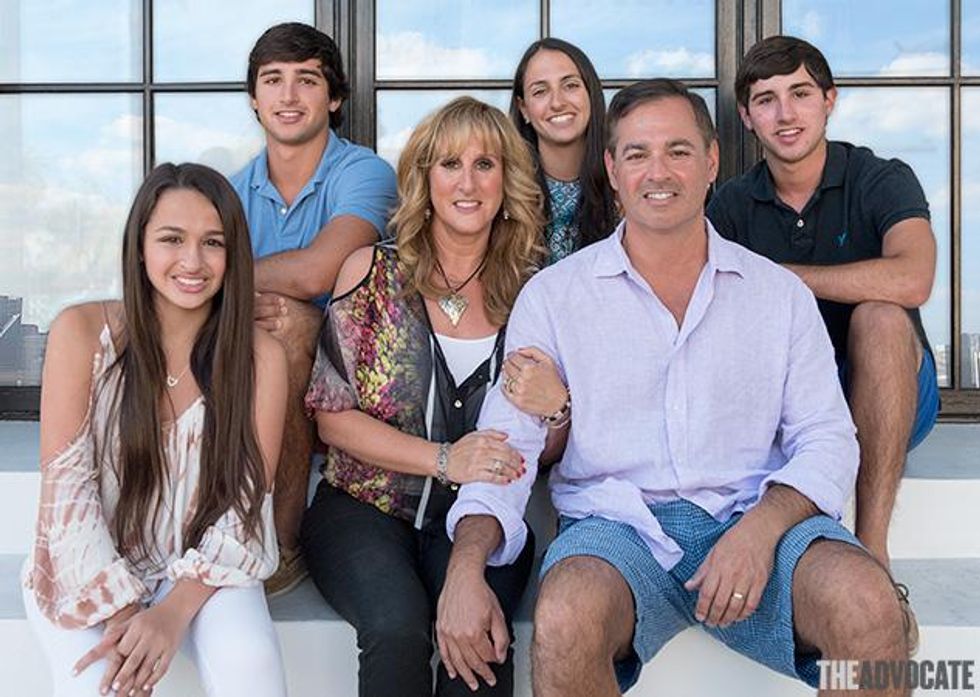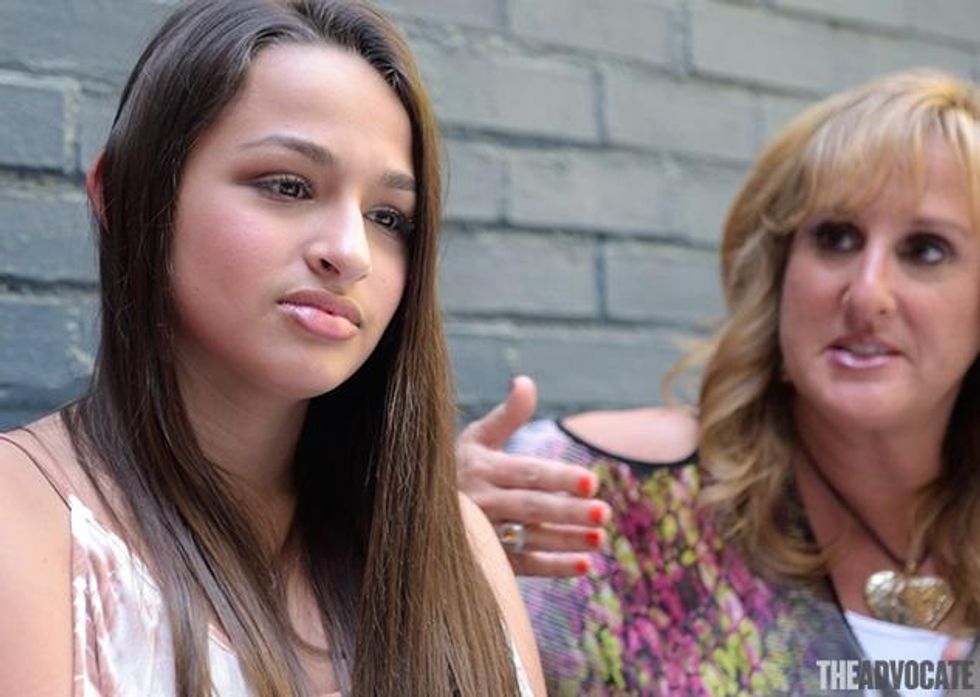Jazz Jennings doesn't want to be labeled the "transgender girl." She wants to be called Jazz, the girl who just happens to be transgender.
The meteoric rise of transgender people in mainstream media has been dominating public conversation lately, both in and outside of the LGBT community. Journalists and commentators are saying that trangender people have reached a "tipping point," thanks to increased visibility with Laverne Cox's character in Orange Is the New Black, Transparent on Amazon, Janet Mock in So Popular! on MSNBC, and of course, Caitlyn Jenner coming out in an interview with Diane Sawyer and her new docu-series airing on E! called I Am Cait.
But Jennings is much younger than these women -- only 14 years old. She is the subject of a new docu-series on TLC called I Am Jazz. The series follows her and her family as she navigates the awkward world of being a teenager, going through puberty, dating, and entering high school.
Although Jennings is young, she's no stranger to cameras following her around and reporters asking her uncomfortable questions about being transgender. Barbara Walters first interviewed her back in 2007, when Jennings was only 6 years old, and famously asked her, "Are you a boy or a girl?"
Because media and advocacy groups are generally run by adults, issues affecting young people (LGBT or otherwise) don't always get the airtime they deserve. In the wake of nationwide marriage equality, activists are looking for focus. Some have suggested trans rights are the next frontier. Others say it's workplace protections. Regardless, these issues focus on adults. Jennings is not yet at the point where she is getting married or getting a job, in the traditional sense.
But in a way, this is her first full-time job. Jennings works hard. She already has a published children's book titled I Am Jazz; she runs a nonprofit organization, TransKids Purple Rainbow Foundation, dedicated to supporting transgender youth; and she makes and sells customized silicone mermaid tails for teenagers (the profits are donated to her nonprofit), designed to make people flip and spin like a mermaid in the water.
The statistics for transgender youth are startling. Nationwide, 40 percent of all homeless youth are LGBT. More than 50 percent of transgender youth will have attempted suicide at least once by their 20th birthday. That doesn't even take into account the countless headlines that come across newsfeeds, mourning the deaths of transgender teenagers such as Leelah Alcorn, a 17-year-old who killed herself because her parents rejected her desire to openly express her gender identity.
I Am Jazz is not only about Jenning's journey into puberty. It's about a family transitioning with their youngest member and learning how to support her. The family support highlighted in the show is just as important as the positive representation of Jennings as a teenager who fully embraces her identity, without any shame over being who she is. I Am Jazz is also about a family coming into their own fame. This was an inevitable moment in the Jennings family journey, according to Jazz's mother, Jeanette Jennings, who told The Advocate, "We always felt that we might end up doing this." After her daughter spent most of her life coming in and out of the media spotlight since the age of 6, Jeanette says, "We felt that we were progressing to this phase, where we might share our story more in depth."
 "We always felt that to capture the true essence of Jazz and a trans youth, to educate people on what it's like to raise a transgender child and to be transgender, you really had to see it on a more lengthy scope of time," adds Greg Jennings, Jazz's dad.
"We always felt that to capture the true essence of Jazz and a trans youth, to educate people on what it's like to raise a transgender child and to be transgender, you really had to see it on a more lengthy scope of time," adds Greg Jennings, Jazz's dad.
He is referring to the brief encounters the family had with 20/20, ABC, Barbara Walters, and an OWN documentary, which were all short segments where you had a "filtered view of what the story was about," says Greg.
At 14, Jennings is "the right age, our family was as prepared as we were ever going to be, and there were also other things going on in the world that we felt were important," says Greg. Following yet another heartbreaking headline about a trans teen taking their own life, the Jennings family felt an inclination to do something because they "felt helpless, like change wasn't coming fast enough and this, we thought, would move change a little faster," says Greg.
Jazz speaks in the first person plural when she talks about why she and her family made the decision to air their private life on TLC. In sharing "our" story, she says, "it has never been about our own further gain or really just about us, but really more about 'our' message and helping other people and if we could just share our story ... on this large platform, then we hope we are able to convey our message easily."
The show does not shy away from the ugly side of being a teenager. In one scene, Jazz and her mom are sitting, drinking coffee outside, looking out onto a shopping mall parking lot, when two teenage boys walk by and shout at Jazz, calling her a "tranny freak." Obviously her mother hears it and is shocked that they are cruel enough to say something so callous out loud and even more surprised that Jazz's response was so calm. Jazz's parents strive to support their daughter and provide a safe environment. But in practice, Jeanette knows she has no control over the hostility her daughter may face simply for being herself.
Jazz never loses her cool while the cameras were capturing this moment, and she says it's because "When I see ignorant people like that who are just saying things before knowing who I am, then it inspires me to keep sharing my story more and motivates me to keep moving forward."
LGBT youth are "twice as likely as their classmates to say they have been physically assaulted, kicked or shoved at school," according to statistics from the Human Rights Campaign. A 2009 study from Gay, Lesbian, and Straight Education Network determined that "over half of all transgender students had been physically harassed (e.g., pushed or shoved) in school in the past year because of their sexual orientation (55 percent) and their gender expression (53 percent)." The same study found that "almost half of all transgender students reported skipping a class at least once in the past month (47 percent) and missing at least one day of school in the past month (46 percent) because they felt unsafe or uncomfortable."
While many transgender children and teenagers face a lack of acceptance from their families, Jazz acknowledges that she's lucky to have supportive parents who "were really there for me, even at the time when there weren't that many resources, and helped me transition."
Unlike other 14-year-olds, who may shy away from letting everyone in on their most intimate thoughts, Jazz is not afraid to share these details of her life with the world. There's a scene in the third episode, when Jazz visits her therapist, who asks her if she thinks about sex and if she has any idea what gender she is attracted to. This question may sound intrusive not only to teenagers but also adults. But Jazz views those intimate moments as a microcosm of the bigger picture. "Of course there are those moments where, I'm like, why did I say that?" Jazz acknowledges, "I've realized that my privacy and what I'm saying is a sacrifice that I have to make."
Jazz takes viewers through her experience of stopping male puberty and the effects that could come with it. She frankly discusses nightmares she has at night of having hair growing on her body or waking up with a mustache on her face. She lets the cameras follow her as she visits her doctor, who provides her with hormone blockers and suggests that she pursue gender-affirming surgery.
Laverne Cox famously told Katie Couric, "The preoccupation with transition and surgery objectifies trans people." Surgery is always on Jazz's mind, but in a back-burner way. It's not something she wants urgently to have done, and her parents aren't pressuring her to go in any specific direction. But the fact that everyone else is so interested in whether or not she plans to get surgery is not lost on Jazz. "I've noticed that a lot of people are very fascinated with the surgery and the medical aspect," Jazz says, adding that "being transgender is not just a medical transition." Instead, she hopes the show helps audiences understand that being transgender is about "discovering who you are, living your life authentically, loving yourself, and spreading that love towards other people and accepting one another. I Am Jazz definitely shows that; that's what this is all about. It's not just my medical journey, but more about a family loving each other for who they are."

But with that said, Jeanette contends she won't hesitate to push out the cameras and pack up her bags if one day Jazz decides she doesn't want to have her private life on television anymore. If Jazz were to say, "'Mom, I don't want to do this anymore, I'm done,' we pack it up," Jeanette explains, "I would never force her."
Jazz may not yet be as high-profile or come from an entertainment dynasty like Caitlyn Jenner and the Kardashians, but it is fair to assume this show will bring the Jennings family more into the public consciousness than ever before. The docu-series, in following the everyday life of a transgender teenager, will be a first for TLC and for network television.
Caitlyn Jenner transitioned on a public platform at the age of 65, whereas Jazz transitioned privately at the age of 3. Jazz identifies with Caitlyn and feels lucky to exist in a time when she can live authentically at such a young age. "I feel bad for Caitlyn," Jazz says earnestly. "I wish she could have lived her life as who she is right from the start, but sometimes it just doesn't work out that way."
Nevertheless, the 14-year-old commends Jenner's coming-out because it "shows people that you're never too old to transition and live your life as who you are."
Like Jenner, Jennings is a dedicated athlete. Greg, Jazz's dad, relays a quote that Jazz references often to the family, when she says, "If I could just pee in peace." For transgender people, the ability to use a public restroom can be a source of conflict, because they face harassment for using the restrooms of their affirmed gender. Transgender athletes face a similar bias in sports. If they want to play on a team for a gender that they were not assigned at birth, there aren't enough laws protecting them from facing discrimination because of their gender identity. Jazz's family spent two years pursuing a case in court to get the soccer league to allow her to play on the girls' team. The family won the case; she now plays on the girls' team and will be playing on the girls' team in high school. Greg, Jazz's dad, says, "The sooner that families don't need to fight just to be able to play on the right sports team or have to fight for their kids to use the bathroom of their affirmed gender, the sooner everybody in society will say, 'OK, it's not that big of a deal.'"
Griffen and Sander, Jazz's brothers, both call their little sister their "hero." Jeanette calls Jazz "a great spokesperson ... obviously she was meant to do this in certain ways, like, almost destiny."

Not all parents of transgender children are as supportive as Jeanette and Greg, and parents often reach out to them, asking for advice on how to raise a transgender child. Jeanette always offers them a piece of advice that she received from a friend, which goes, "There's a child that was given to you, and then there's the child that you want to have. This is the child that was given to me and I embrace her for who she is." It's hard for some parents to understand what their child is going through, especially for dads, says Greg. In his experience attending support groups, it's mostly moms who show up. "I wish that all dads could love their kids unconditionally, and I know there's societal barriers and ego issues that they have to deal with ... they should try to move mountains to make their child happy and support them and love them," he says.
The members of the Jennings family weren't always so sure of themselves and their decision to follow Jazz's transition. In one scene in the show, Jeanette recalls the first time she used a female pronoun to refer to Jazz, who was only 3 years old at the time. She is walking with a friend in the episode, and she repeats what she told Jazz:
"'You're such a beautiful girl,' but I didn't know if that was right. Am I encouraging my kid to be transgender or gay? I just called my son a beautiful girl. Every time I tell that story, I can't tell it without losing it."
Still today, Jazz's mom gets emotional reflecting on the moment. "I repeat everything that happened and I get choked up. I don't know why," Jeanette says, "but I can't watch myself tell the story. I can't even think about the story. I just do because it was such a pivotal moment."

That was the moment she made the decision to allow her 3-year-old child to transition. At the time, Jazz was already expressing her desire to dress in girls' clothes and to play with girls' toys. "She was still trying to figure things out," says Jeanette, "she wanted so bad to be a girl. I did her hair like a little girl and I called her a little girl for the first time."
Jazz doesn't like labels. She doesn't want to be called the "transgender girl," because she wants viewers to watch the show and understand that "I'm just the average girl."
"It should always be this way," she explains, "and people shouldn't use words to describe people, other than their name or however they want to identity."
"If someone's OK with being the 'transgender girl,' that's fine, but that's not me," she says.
Watch an exclusive clip from tonight's episode here:
Watch a clip of I Am Jazz, airing tonight at 10 on TLC. As the family heads to Gainesville to help Ari move out of her dorm, Jazz Jennings gets a glimpse into what college life has to offer. Griffen and Sander's friend questions whether being transgender is a choice.
Posted by The Advocate magazine on Tuesday, July 28, 2015
Photography by Yannick Delva


 "We always felt that to capture the true essence of Jazz and a trans youth, to educate people on what it's like to raise a transgender child and to be transgender, you really had to see it on a more lengthy scope of time," adds Greg Jennings, Jazz's dad.
"We always felt that to capture the true essence of Jazz and a trans youth, to educate people on what it's like to raise a transgender child and to be transgender, you really had to see it on a more lengthy scope of time," adds Greg Jennings, Jazz's dad.




































































Charlie Kirk DID say stoning gay people was the 'perfect law' — and these other heinous quotes